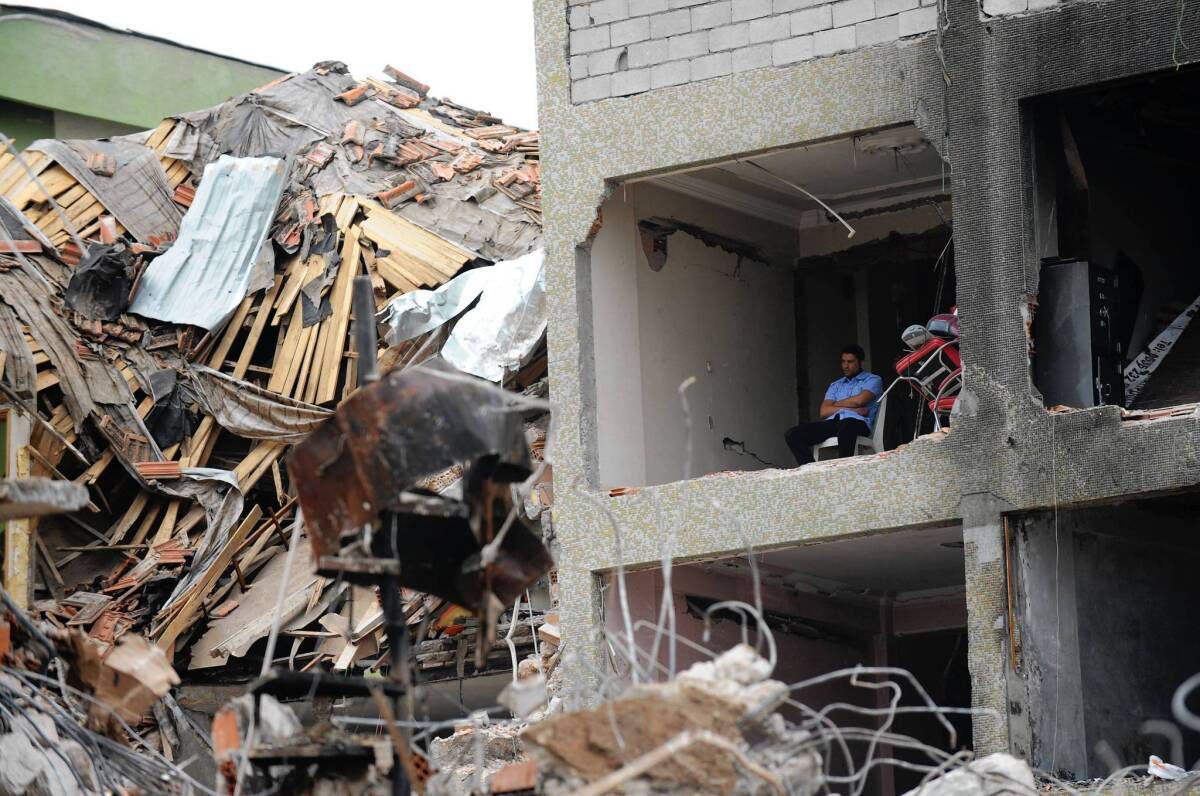In Turkey, anger grows in city hit by bombings

- Share via
REYHANLI, Turkey — Two weeks after twin car bomb blasts killed 51 people and injured hundreds in this southern Turkish city, residents remain in a state of shock and unease.
Laborers silently lug sacks of cement or new windowpanes into damaged buildings, and sweep out dust and shattered glass. Electric drills growl while hammers beat against nails. Nobody says much, but those who do express a clear sense of fury about being dragged into the bloody conflict in Syria, just across the border from Hatay province.
“The government is losing control of Hatay,” said Ugur Yeliz, a transportation worker whose office sits just yards from the blast site on a once-bustling market street. “We are angry; these bombings should never have happened.”
The May 11 car bombings cast into focus the international dimensions of Syria’s war, while raising fear that Turkey — its government long a supporter of Syria’s insurgents — is being dragged into the conflict.
A galvanized opposition has staged protests throughout Turkey in the last week, calling for Prime Minister Recep Erdogan to reconfigure the country’s policy toward its warring neighbor. The attacks have widely been seen as “blowback” for the Ankara government’s support of Syrian rebel forces.
Since the tragedy, the thousands of Syrians who have come to Reyhanli since the conflict began two years ago — mostly civilian refugees and opposition fighters — are nowhere to be seen.
Meanwhile, 12 Turks have been detained in connection with the attacks. They are reportedly members of a radical leftist group based in Syria and led by Mihrac Ural, a Turkish national linked to Syria’s ruling Assad family. He now has a $100,000 bounty on his head.
The Turkish government has provided logistical support and medical care to Syrian insurgents. It is widely believed to have supplied rebel units with weapons, though Ankara denies this. Arms from elsewhere, such as Qatar, reportedly move freely across the Turkish border to Syrian rebels.
Turkey has aggressively backed efforts for a change in government in Damascus and has often found itself well ahead of its allies.
Some here say the consequence is that Hatay is a new front line in Syria’s civil war. In February, a car bombing at the nearby Bab Hawa border crossing in Syria killed more than a dozen people.
“This war is Syria’s problem; they are slaughtering each other,” says storekeeper Teyfik, who did not want his last name used for security reasons, standing near the blast site. “Why involve Turkey in this? Why bring that here?”
Foreign Islamic militants are said to move openly through Turkey’s southern regions, where they are picked up by minivans bearing Syrian plates and shuttled across the border to front lines in Idlib, Aleppo, Hama or Homs.
The Free Syrian Army is believed to manufacture explosives in workshops around Antakya. Munitions, some sourced from underground weapons bazaars in Libya, flown to Qatar and moved on to Turkey, reportedly flow across the porous border.
More than 300,000 Syrian refugees are spread out in 17 refugee camps in southern Turkey. Despite the country’s economic brawn, the strain is beginning to show, with the government spending $750 million to house the Syrians.
Meanwhile, concern continues to mount that Turkey’s government, in siding with autocratic Sunni Muslim nations such as Qatar and Saudi Arabia, will become increasingly sectarian.
The country’s Alevi minority, spread out through the south, already complains of discrimination. Turkish Alawites, an important minority in Hatay, share blood and business links to Syria’s Alawites, a Shiite offshoot whose members include embattled President Bashar Assad. Sunni-Shiite tension is beginning to emerge in Turkey, fueled in part by the large presence of Syria’s Sunni opposition fighters.
Turkey must “stop betting on a quick resolution of the Syria crisis,” the International Crisis Group cautioned in a recent report. It urged Ankara to provide “full support for a negotiated settlement” and take steps to “avoid any perception in the region that it is seeking to act as a partisan, Sunni Muslim hegemon.”
So far, Turkey appears to have signed on, however reluctantly, to a U.S.-Russian plan for an organized Syrian peace conference. Ankara’s calls for a U.S.-backed no-fly zone in northern Syria have gone nowhere. The Turkish government is hesitant to act unilaterally in Syria.
Here in tense Reyhanli, the worry is that the recent car bombings are but the beginning.
“I don’t know how this will end,” Yeliz, the transportation worker, says as scores of heavily armed Turkish police officers patrol the bombing site.
A laborer throws debris from the third floor of a building, its walls scorched to charcoal. Ruin hangs heavy. No one talks.
Johnson is a special correspondent.
More to Read
Sign up for Essential California
The most important California stories and recommendations in your inbox every morning.
You may occasionally receive promotional content from the Los Angeles Times.













